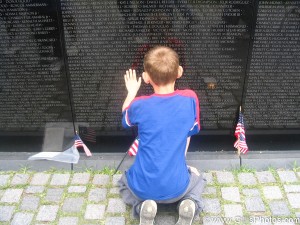 By Robert Gillis
By Robert Gillis
Published in The Foxboro Reporter May 2000 and edited for the Boston City Paper May 2007
Memorial Day 2000 is here. People will visit cemeteries and place flowers and flags on the graves of veterans who died protecting this country. Others will participate in parades and ceremonies honoring those fallen soldiers, attended by many of the surviving veterans who have served this country so well.
Here in town, many will do the same, while others will prepare for Foxboro’s June birthday, and read Jack Authlet’s annual Memorial Day column, which will, as always, remind us that we must never forget the price so many have paid for the freedom and rights we take for granted.
Being from a different generation, I though I might add my own Memorial Day impressions. At 35, I didn’t live through either world war, Korea, or even the Cuban Missile Crisis. I don’t even remember Vietnam.
As I thought about that, I realized I wanted to speak to people like me who don’t remember or didn’t live through the horrors and wars of years ago. More importantly, I wanted to speak to the teenagers — whose only memory of a “war” is probably Kuwait in 1991. The ones who think the nation has always been at peace.
Of course, any sentiments about encouraging the youth of this town to read up on the history of this nation, and to remember those who died to protect us, would be well-intentioned but probably fall on deaf ears (yet I will try).
The kids are not interested — at least, not yet — because they’re too busy dating, driving their parents crazy, playing sports, going to school, and trying to figure out who they are and their place in the world.
But that’s okay. That’s a teen-ager’s job. And one of things those soldiers died for was the right of their children and grandchildren to grow up free, to begin to make their own decisions, and to figure out what’s important to them and what their role in the world will be.
When I was teenager, I also didn’t care much about history or politics. Memorial Day was just another welcome holiday from school. During those years, as Nana talked about those who died in World War I, and while Dad was talking about friends who died during World War II and Korea, my mind was elsewhere, like most kids that age.
As an adult, I realized I had been listening all along, I just didn’t know it. I remembered more of those stories than I thought. One in particular comes to mind:
At the conclusion of World War II, Johnny McLaughlin, on of my father’s closest friends, took a gas can and ran a strip of gasoline the length of Trull Street. He ignited it, causing a bright flame to whoosh down the street as many cheered. Everyone in the neighborhood was frenzied and joyful, celebrating the return to peace, except one woman, who said nothing, began to cry, and went home. Her son had died overseas. He wouldn’t be coming home.
I don’t remember the woman’s name, but the message got through. A lot of people — a lot of young people — didn’t come home back then. They died for us.
Still, it’s difficult for someone my age, and nearly impossible for a teen-ager today, to comprehend a time when the world was literally on the edge of the abyss, when the threat of enemy bombs was a reality, when so many people (kids, really) died every day, when Hitler and other forces of evil tried to take over the world, when innocent millions died by brutal violence. A time when the future was dark and uncertain.
To those born afterward, it’s hard to imagine what those times must have been like. Many younger people have come to accept our freedom and peaceful times as having always been there, but just a short time ago, it was nearly taken away.
To those born afterward, it’s very easy to ignore all that has happened beforehand. It’s easy not to take interest in history, it’s easy to take the world as it is today for granted.
In time, it will be easy to forget.
But that must not happen. “Those who forget the past are condemned to repeat it” is cliché but true. As more and more years pass since those great conflicts and sacrifices, the younger generations MUST take the time to understand. The freedoms we enjoy today can be threatened, even taken away, very quickly.
Memorial Day is a time for remembering the dead and their great sacrifice. It is a day for quiet reflection about how millions of people gladly volunteered to serve this country and protect its future. But like Veteran’s Day, it should also be a day for being thankful for all the things the fallen heroes have given to us.
Memorial Day is a day of remembrance. But that remembrance is more meaningful when a person looks at today’s world and realizes the liberty they enjoy is a gift from another generation.
So to the younger folks and those who don’t remember, a good start is to take a moment — just one moment — to look around and be thankful for all you have, and acknowledge that you have a responsibility for remembering the past. If someone in your family or someone you know served this country, talk to them about it sometime. Talk to people who lived those times — even if you’re not really interested right now. Someday you’ll remember the stories, and you’ll appreciate the sacrifices that were made for you.
To all who served this nation so well and helped preserve our way of life and freedom — living, dead, and missing — this country thanks you, and will always remember you.